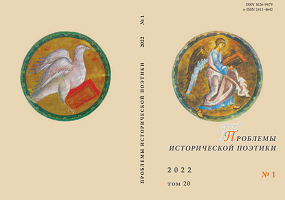Аграфа «В чем застану, в том и сужу» у В. Шекспира и раннего Н. А. Некрасова
The Agraphon “In What I Find, in That I Judge” in W. Shakespeare and Early N. A. Nekrasov
Author(s): Vladimir I. MelnikSubject(s): Christian Theology and Religion, Russian Literature, Other Language Literature, Translation Studies
Published by: Петрозаводский государственный университет
Keywords: Nekrasov; “Dreams and Sounds”; Shakespeare; “Hamlet”; Boratynsky; Benediktov; agraphon; the moment of death; religiosity; Holy Fathers of the Church;
Summary/Abstract: The article provides the first detailed commentary on Nekrasov’s poem “Death.” Nekrasov’s first poetry collection “Dreams and Sounds” has barely been studied. Meanwhile, it entirely reflects the spiritual formation of the seventeen-year-old poet, his devotion to the ideals of Orthodoxy and youthful determination to lead a truly spiritual life. Religious poems in “Dreams and Sounds” (they comprise more than half of the poems in the collection) reveal unexpected spiritual experience in the young man. He confidently introduces the teachings of the Holy Fathers, elements of church preaching, etc. into his verses. In his poem “Death” he speaks of the “transition” of the human soul from the earthly world to the heavenly one and especially emphasizes the question of a moment of death that is favorable from the Christian point of view. The poem is a poetic realization of a well-known agraphon, a phrase attributed to Christ: “In what I find, in that I judge.” Nekrasov could hear this expression in church at a sermon, or in the family. But the immediate impetus for the creation of this poem was probably the reading of Shakespeare’s play “Hamlet” in N. Polevoy’s translation. “Hamlet,” who also knows the agraph “In what I find, in that I judge,” in the scene of Claudia’s prayer juxtaposes two states in which a person can be caught by death: a state of sin and being immersed in prayer. The young Nekrasov should have been struck by the skill with which Shakespeare transformed a familiar expression into a “pearl of creation,” which probably prompted him to write one of the best poems in “Dreams and Sounds.”
Journal: Проблемы исторической поэтики
- Issue Year: 20/2022
- Issue No: 1
- Page Range: 134-148
- Page Count: 15
- Language: Russian

